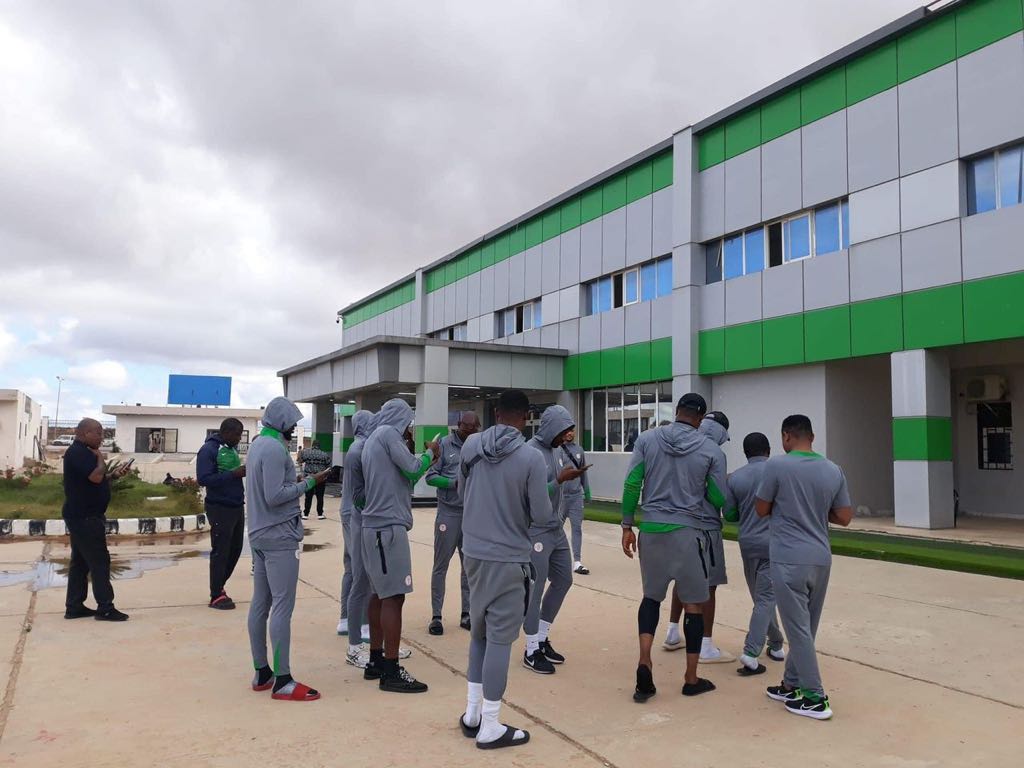This week was packed with significant developments across sports, politics and governance. From the Super Eagles’ ordeal in Libya to Zamfara Governor Dauda Lawal’s remarks on security, the week offered much to discuss. We also saw debates over Enugu’s mortuary tax, a lively exchange between Shehu Sani and Hadiza El-Rufai on social media, and Anambra Governor Soludo’s rejection of local government autonomy.
Outrage over Super Eagles ordeal in Libya
One of the major stories within the week was the outrage that trailed the poor treatment of Nigeria’s senior national team, the Super Eagles, during their trip to Libya for the second leg of 2025 Africa Cup of Nations qualifier against Libya.
The Nigeria Football Federation, on Monday, decided to pull the Super Eagles out of Tuesday’s 2025 Africa Cup of Nations qualifier against Libya.
This was after a frustrating 12-hour ordeal at Al Abraq International Airport in Libya, where the team had been stranded since their arrival on Sunday afternoon.
- Ahmed Musa rolling back the years in style
- El-Kanemi Warriors, Tornadoes proving doubters wrong with inspiring results
The Nigerian delegation was en route Benghazi for the crucial qualifier when their chartered aircraft was diverted mid-flight to Al Abraq, a small airport typically reserved for hajj operations.
The unexpected diversion left Super Eagles players and officials stranded without any assistance from the Libyan Football Federation, which failed to provide transportation.
Prominent personalities including President Bola Ahmed Tinubu, the National Assembly, sports enthusiasts and Nigerians have condemned the dehumanising treatment, calling for thorough investigation and appropriate sanctions mete out by CAF.
President Tinubu said that he was deeply moved by the ‘inhuman treatment’ endured by the Super Eagles of Nigeria at a Libyan airport, warmly welcoming their safe return to Nigeria.
In a statement by Presidential spokesman, Bayo Onanuga, President Tinubu said he expected the Disciplinary Board of the Confederation of African Football (CAF) to conduct a thorough investigation and recommend appropriate action against those who wilfully violated the organisation’s Statutes and Regulations.
Similarly, Nigeria’s National Assembly (NASS) also expressed outrage over the inhumane treatment meted out to the Super Eagles of Nigeria and their delegation at Al-Abraq International Airport in Libya, describing the incident as unacceptable.
Both houses of the National Assembly on Tuesday unanimously condemned the behaviour of Libya towards the Nigerian senior national team and resolved to probe the unacceptable incidents that necessitated the withdrawal of the Super Eagles from the AFCON match.
Adelabu’s claim of Nigerians not making noise over N1,000/l fuel
The Minister of Power, Adebayo Adelabu was in the news this week when he said most Nigerians have stopped complaining about the high cost of petrol because they no longer rely solely on their generators for electricity.
The minister stated this in Lagos, during his keynote address at the 2024 edition of the Nigeria Energy Exhibition and Conference, with the theme, “Breaking Barriers in the New Energy Era: Clean, Reliable and Sustainable”.
The pump price of petrol recently rose to over N1,000 per litre after Nigerian National Petroleum Company Limited (NNPCL) announced the end of the sole off-taker arrangement with the Dangote Refinery.
This led to the sharp increase in the cost of transportation, food items and other essential household commodities in the country.
But speaking at the conference, the minister said the people were not making a loud noise about the increase as they didn’t have to buy petrol at N1,000 to power their generators before enjoying electricity.
He said, “People don’t need to buy petrol again as much as they used to do for them to have power. That’s why the noise is even at this level. If they had to be going to the filling stations to buy N1,000 per litre of petrol to generate electricity, we would have even had louder noise from the public.
“So, what we intend to do is to make sure that all the generators are replaced in line with Lagos State Policy of Replacement of 1 Million Generators in One Year. I saw that. We must replace all the generators.”
The minister lamented Nigeria’s abysmal performance in the area of power generation, stating that the country added only 2000 megawatts of power to the national grid in the last 40 years dating back to 1984.
“But we are over 200 million people, we are still celebrating achieving the 5000MW milestone. Why this seems to be an achievement is because it took us almost 40 years to generate additional 2000MW from the 2000MW milestone we achieved in 1984. When we came to the office, we met 4000MW.
“Now, we have taken it to an average of 5000MW, with a peak of 5,527MW on the third of September. But we are not deterred. If the last best time was 50 years ago, I believe the next best time is today, and this must wake us up. So, it’s an issue I don’t like to remember,” he said.
Zamfara gov and bequeathing of security problem to God
Zamfara Governor Dauda Lawal was in the news over his comment that the security of the state is now in the hands of God.
The governor said though his administration was doing all it can to bring the security situation in his state under control, the security of the state is “in the hands of God.”
Speaking to journalists at the State House in Abuja after meeting with Vice President Kashim Shettima, Lawal emphasised that his team was doing everything possible to address the security challenges plaguing the state.
The governor’s statement comes as Zamfara continues to grapple with banditry and related violence.
In May, Governor Lawal reiterated his commitment to securing lives and properties during a state security council meeting, thanking the federal government for deploying additional troops to Zamfara.
“We are doing the best that we can to make sure we secure the lives and properties of our people… we’re doing the best that we can,” the governor said.
Weekend Trust reports that one of the campaign promises of the governor include tackling the myriads of security challenges in the state.
For instance, during his campaign train to Maradun LGA in February 2023, he promised that if elected as governor, he would provide adequate security to all communities and highways in the state.
Enugu gov’s tax on corpses
The administration of Governor Peter Mba of Enugu State came under spotlight within the week following the imposition of tax on dead bodies deposited in mortuaries in the state.
The daily N40 tax per corpse has been generating reactions from Nigerians, with some describing it as weird.
Meanwhile, the Enugu State government has clarified the controversial mortuary tax imposed on corpses in the state, stating that it was not intended as a revenue-generating measure but rather to discourage storage of bodies in mortuaries.
The Executive Chairman of Enugu State Internal Revenue Service, Mr Emmanuel Nnamani, said this while reacting to the Mortuary Tax circular addressed to all mortuary attendants.
“Kindly ensure that owners of corpses make the payments before collection of the corpses for burial and then remit same to the ESIRS in any commercial bank under the mortuary tax in Enugu State IGR Account,” the circular read.
Reacting, Nnamani said that the tax was not new to the state, adding that it was within the Enugu State Mortuary Tax Law which had been in existence for years.
According to him, the amount to pay as the mortuary tax was N40 daily, not N40,000.
“It is an indirect tax paid by mortuary owners, not deceased family and it is just N40, not N40,000. Since its introduction, nobody has been denied burying their dead ones.
“It means that if the corpse stays in the mortuary for 100 days, the mortuary is expected to pay to the state a sum of N4,000.
“The tax is not meant to generate revenue but to discourage people from taking their dead ones to the mortuary all the time,” Nnamani stressed.
Shehu Sani, Hadiza El-Rufai’s tango over X post
In the week, former First Lady of Kaduna State, Hadiza El-Rufai, openly corrected a former Senator and human rights activist, Shehu Sani, over his statement on a social media platform.
Sani, who represented Kaduna Central in the 8th Assembly, had written in an X post about President Bola Tinubu travelling out of the country and the connection to the hike in prices of commodities.
In the post, he argued that the President’s foreign trip affects taxes and commodities prices.
“New law of economics; When the President travels out, taxes and prices goes up,” he wrote.
Reacting to the post, Mrs El-Rufai, said Sani’s post should have read “go up” and not “goes up.”
While in office, Governor Nasir El-Rufai and Sani were involved in a political battle.
There are reports that the rift cost the former lawmaker his seat in the Senate in 2019.
Sani left the All Progressives Congress at the height of their rift.
He sought to be re-elected into the Senate but lost to Uba Sani, incumbent governor of Kaduna and former ally of El-Rufai.
But in his response, Sani, referred to the former First Lady as “mummy,” urging her to leave him alone.
“I unfollowed you and you unfollowed me. And you still de hang around me. Mummy, leave me alone abeg,” he wrote.
Soludo’s controversial rejection of LG autonomy
Anambra State governor, Prof. Chukwuma Soludo, was in the news following his position that granting full autonomy to Nigeria’s 774 local government areas could lead to “humongous chaos,” arguing that such a move would not result in sustainable development.
He made this statement on Tuesday at the Governor’s Lodge in Amawbia, Awka, after signing the Anambra State Local Government Administration Law.
The law, titled: “Anambra Local Government Administration Law 2024,” was passed by the State House of Assembly last Thursday.
Soludo emphasised that Section 7 of the constitution empowers state governments to enact laws for the administration of local government areas, underscoring the importance of state oversight.
He said, “The absolute autonomy to the 774 local government areas in the country is an impossibility. In fact, it is a recipe for humongous chaos. The attendant challenges before the issue of local government autonomy are such that would certainly deepen the fate of the system and spell doom for the expected beneficiaries of the process if not well planned.”
Soludo explained that the new legislation aims to ensure consistency, transparency and collaboration among the different tiers of government.
This development coming after a Supreme Court verdict granting full autonomy to the third tier of government has continued to spark condemnation from Nigerians.
On July 11, 2024, the Supreme Court delivered a landmark judgment affirming the financial autonomy of Nigeria’s 774 Local Government Councils.
The seven-member panel, led by Justice Mohammed Garba, unanimously upheld a suit brought by the federal government aimed at reinforcing the independence of local governments across the country.
The court also rejected the stance of state governments that sought to dissolve democratically elected local government councils.

 Join Daily Trust WhatsApp Community For Quick Access To News and Happenings Around You.
Join Daily Trust WhatsApp Community For Quick Access To News and Happenings Around You.


